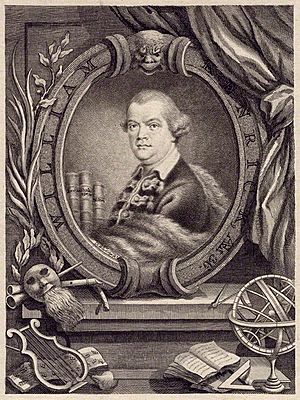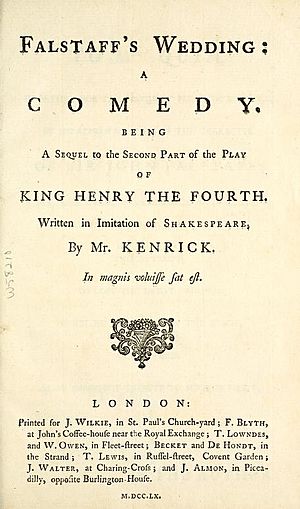William Kenrick (writer) facts for kids
William Kenrick (born around 1725 – died June 10, 1779) was an English novelist, playwright, translator, and satirist. He spent much of his career criticizing and making fun of other writers.
Contents
About William Kenrick
Kenrick was born in Watford, Hertfordshire. His father was a stay-maker, someone who made parts for corsets. Kenrick seems to have earned a special degree from Leiden University, though some say he went to a Scottish university.
He first appeared as a writer of short books in 1751. He wrote under the name "Ontologos." He published a book called The Grand Question debated, which explored if the human soul was immortal. In a typical move, Kenrick then wrote another book answering his own question, proving the opposite! He often used this trick to get attention for his writings.
One of his first targets was the writer Christopher Smart. Kenrick attacked Smart's poem Night Piece in a journal called The Kapelion in 1750. He used the pen name Whimsey Banter for this.
In 1752, Kenrick openly made fun of famous writers Henry Fielding and Tobias Smollett. He did this in his play Fun: a Parodi-tragi-comical Satire. This play was a funny copy of Macbeth. In it, characters threw modern books and magazines into a pot. However, the play was stopped by city officials before it could be performed.
Kenrick's Success
Kenrick's most popular book was The Whole Duty of a Woman. It was published in 1753 and reprinted over 20 times. This book was a guide to good manners for women. The author was simply listed as "A Lady." Kenrick pretended to be a woman who had made mistakes but was now reformed. She wanted to help other women live good lives. It's interesting that Kenrick, who was known for being harsh, tried to teach women about good behavior.
Editor and Critic
In November 1759, Kenrick became the editor of The Monthly Review. He took over from Oliver Goldsmith. Kenrick immediately wrote a very strong criticism of Goldsmith's book, "Enquiry into the Present State of Polite Learning in Europe." His attack was so unfair that the publisher, Ralph Griffiths, later apologized for it.
Kenrick's Published Works
Kenrick translated a famous French novel by Jean-Jacques Rousseau in 1761. The original was called Julie, ou La Nouvelle Héloïse. Kenrick changed the main character's name to Eloisa, saying it didn't matter to the reader. His translation was very popular and was reprinted six times by 1776.
In 1765, Kenrick published a review of Dr. Johnson's new edition of Shakespeare's plays. Kenrick criticized Dr. Johnson's work and defended Shakespeare.
Plays and Other Writings
Kenrick wrote a comic play called Falstaff's Wedding. It was a follow-up to Shakespeare's Henry IV, Part 2. The play was published in 1760. A changed version of the play was performed only once in 1766.
His play The Widowed Wife (1767) was more successful. It was performed for 14 nights and then again the next season.
In 1770 and 1771, Kenrick wrote two pieces about perpetual motion. This is the idea of a machine that could run forever without needing more energy. The pieces were called An account of the Automaton, or Perpetual Motion of Orffyreus and A Lecture on the Perpetual Motion.
In 1772, he published Love in the Suds. This was a direct attack on the famous actor David Garrick. Garrick took legal action against Kenrick. Kenrick then had to publish an apology.
In 1773, Kenrick published A New Dictionary of the English Language. In this dictionary, he showed how to pronounce words using special marks. He also divided words into their syllables. This dictionary was meant to be a response to another dictionary that Kenrick felt was not good because it came from Scotland. In the same year, his comedy The Duellist was performed at Covent Garden. However, it only lasted for one night.
In 1775, Kenrick started a book review magazine called The London Review of English and Foreign Literature. This magazine ran from 1775 to 1780. It was a monthly magazine that reviewed books and often criticized many writers and their works. It also gave bad reviews to the Covent Garden and Drury Lane theaters. Kenrick's son, William Shakespeare Kenrick, continued the magazine for a year after his father's death.
In 1778, two more of Kenrick's plays were produced. The Lady of the Manor was a comic opera with music by James Hook. This was Kenrick's most successful opera. The other play was The Spendthrift; or, The Christmas Gambol, a short, funny play. It was based on an older play and was taken off after only two nights.
From 1778 to 1779, Kenrick also managed a translation of Voltaire's works into 8 volumes.
Images for kids
 | Precious Adams |
 | Lauren Anderson |
 | Janet Collins |





